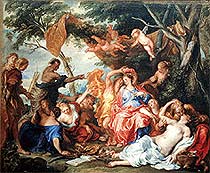The madrigal is a genre of secular music that developed in Italy in the 1500s and reached its peak there around the turn of the seventeenth century. The popularity of the genre continued when it was exported to England in a volume entitled Musica Transalpina. Confusingly, it is unrelated to the fourteenth century Italian musical genre of the same name.
Unlike the formes fixees that characterized French lyric poetry, the poetry of the Italian madrigal has neither a fixed rhyme scheme, nor a fixed stanza length. What unites all madrigal poetry however is the free alternation of lines of seven syllables with lines of eleven syllables.
The main stylistic trait of the madrigal is its use of word painting: the musical illustration or representation of the text. The idea of word painting was perhaps derived from the writings of Pietro Bembo, an influential Italian literary theorist. Bembo's theory posited that certain words could convey feelings of dignity or sweetness depending on their vowels, consonants, rhythm, rhyme and context. In essence the words themselves had a visceral effect on the listener. In time, word painting would begin to be taken to an extreme and a catalog of signifiers began to develop.
Claudio Monteverdi would eventually compose nine books of Madrigals, each of which stretched the limits of music and the genre further. Cruda Amarilli the first of the Fifth book of Madrigals of 1605 was the work that particularly bothered the polemicist Artusi.
The text of Cruda Amarilli comes from one of the madrigalist's favorite poems: Il Pastor fido [The Faithful Shepherd] (1589) of Giambattista Guarini, an extremely complicated tragi-comic pastoral drama. More than a hundred composers set its verses in over five hundred madrigals. The setting is Arcadia in ancient Greece and its main characters are Amarilli (a lovely maid) and Silvio, both descended from gods; and Mirtillo. An oracle has promised that an ancestral scourge can be absolved through the marriage of two descendents of gods and the intervention of a shepherd. Consequently, Amarilli is engaged to Silvio. Problematically, Silvio, thinks only of hunting and his dog, to the exclusion of sex; and Amarilli really loves Mirtillo. Mirtillo loves her in return, but out of propriety Amarilli does not protest her engagement. At Mirtillo's first entrance he intones the poem "Cruda Amarilli" expressing his hopeless love for Amarilli. The remainder of the plot is so ludicrous as to make a Bollywood film seem tame by comparison. It is interesting to note that the name Amarilli derives from "Amar" which means "bitter" and is related to "amor" meaning "love."
Various musical motives are assigned to various parts of the text in order to palpably represent Mirtillo's angst. This is particularly apparent at the phrase "Ahi, lasso" (The passage to which Artusi took particular umbrage) in which Mirtillo's sensual desire and extreme emotion are made musically audible in flights of dissonance.

